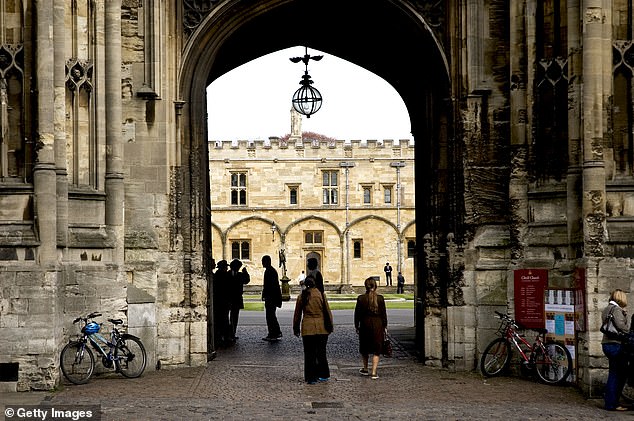In the city of dreaming spires you’ll find Oxford Business College, a place where ‘ambition meets opportunity and education drives success’.
Judging by videos on its website, this noble seat of learning is only one step removed from Brideshead Revisited.
Here you’ll see young students cycling along cobbled streets, walking down the steps of historic limestone buildings or rowing through the dawn mist on a tranquil River Cherwell.
The reality of life at Oxford Business College is, however, somewhat different. This becomes immediately apparent when I pay a visit to the ‘main campus’.
According to the advertising bumf, this venue is ‘situated in one of the city’s many historic buildings’ and will be ‘buzzing with energy and activity’.
Instead, I find a black entrance door, bolted shut on a tatty row of shops opposite the bus station.
The venue is sandwiched between a ‘pan-Asian’ cafe and a derelict Chinese restaurant that was previously called Opium Den and is now covered in graffiti.
Stairs lead to the first floor where, through a cracked window pane, I can see a sign bearing Oxford Business College’s logo.

In the city of dreaming spires you’ll find Oxford Business College (pictured), a place where ‘ambition meets opportunity and education drives success’

The firm is co-owned by its director, Padmesh Gupta (pictured)

Mr Gupta owns the firm along with a dress designer named Titiksha Shah (pictured)
A piece of A4 paper next to the security camera informs visitors that the ‘due to ongoing refurbishments, this campus and its offices are temporarily closed’.
It says that the college has instead relocated to King’s Mead House, a modern commercial building near the railway station roughly half a mile away.
Here, too, I look in vain for much ‘energy and activity’ or any sign of the ‘melting pot of modern influences and cultures’ advertised on the website.
Actually, Oxford Business College’s ‘main campus’ appears to be above a Royal Mail sorting office. But it, too, seems eerily quiet.
Not a single person crosses the threshold until half an hour after I arrive, when the front door finally opens, and a man and woman who appear to be in their thirties step outside and each light a cigarette. When I approach, a brief conversation ensues.
The man, who is wearing a tracksuit and speaks with a thick eastern European accent, confirms they are both students and that, despite the absence of people, we are in the middle of term-time.
I identify myself as a reporter and his attitude hardens. He says he won’t answer further questions. Instead, ‘you need to speak to the Boss man’.
It’s all very strange. Surreal even. But as I am fast discovering, Oxford Business College – or OBC – is a very unusual place indeed. In fact, it lies at the centre of a mounting political scandal.

Judging by videos on its website, this noble seat of learning is only one step removed from Brideshead Revisited. Pictured: File photo
On Tuesday, this privately owned provider of higher education courses was the subject of a damning written statement to Parliament by the Education Secretary, Bridget Phillipson.
She stated the college’s 10,000-odd students are to be banned from receiving student loans.
Phillipson claimed to have ‘credible concerns’ about ‘recruitment and attendance’ at OBC, saying that an investigation by the Government’s Internal Audit Agency had raised fears that it was recruiting students whose ‘competence in the English language’ was inadequate and wasn’t monitoring whether they attended class.
Four universities, which have in recent years paid Oxford Business College to educate thousands of undergraduates on degree courses under lucrative franchising arrangements, have ‘terminated their agreements’ with the organisation, the Education Secretary continued.
Behind this announcement lies a hair-raising scandal involving student loan fraud. It appears to have left the British taxpayer on the hook for millions – perhaps billions – of pounds. The whole thing revolves around students who dishonestly enrol on ‘franchised’ degree courses at private, for-profit institutions such as Oxford Business College, despite having little to no intention of ever doing any actual studying.
Instead, the fraudsters want to use their phoney status as students to access tens of thousands of pounds in government loans… which they will never, ever pay back.
The true scale of this scam is unclear. But the Sunday Times reported last month that a Government probe had uncovered 1,785 fraudulent funding applications, totalling £22million, linked to just six universities, since 2022.
No fewer than 270 individuals at Oxford Business College are believed to have dishonestly claimed £4million in the last two years, it said, though the exact figures may end up being far higher. Ms Phillipson has called such fraud ‘one of the biggest financial scandals in the history of our universities sector’.

On Tuesday, this privately owned provider of higher education courses was the subject of a damning written statement to Parliament by the Education Secretary, Bridget Phillipson (pictured)
The government-owned Student Loans Company (SLC), gives financial support to both British citizens and foreigners with settled status in the UK who wish to go into higher education. People who enrol at university are entitled to access up to roughly £45,000 a year in support.
The first £9,535 covering their annual tuition fees is paid directly to the establishment they attend. Up to £13,348 a year more is then handed out as a ‘maintenance loan’ which goes directly into the student’s personal bank account. Further support, including childcare grants and other hardship loans, can be accessed depending on an individual’s circumstances.
On paper, that loan will later start being repaid, plus interest, when the student starts earning more than £25,000 a year.
But if someone’s declared earnings never hit that threshold, it gets written off after 40 years.
And if a former student disappears overseas, the debt becomes tricky – and in some cases impossible – to collect.
The system has always been open to abuse. But for someone to fraudulently enrol on a course to access loans, with no intention of actually studying, has been reasonably difficult in the past. Firstly, universities generally demand that applicants have at least some academic qualifications. Secondly, the Office for Students requires them to monitor attendance and ensure a student passes some tests and exams.
But in 2011, the Government decided that so-called ‘franchised’ providers – many of them ‘for-profit’ colleges such as OBC – could begin delivering degree courses on behalf of universities, in return for payment.
The big idea was to widen access to higher education to people from ‘non-traditional’ backgrounds, thereby aiding the Department for Education’s quest for diversity.

The government-owned Student Loans Company (SLC), gives financial support to both British citizens and foreigners with settled status in the UK who wish to go into higher education. Pictured: File photo
However, ‘franchised’ providers are not regulated by the Office for Students. As a result, many began allowing almost anyone to enrol (even if they could barely speak English) and remain on courses, even if they barely attended class.
While little in the way of education was going on, cash from the SLC would roll in. Universities would get fees (currently £9,535 a year), from which the franchised provider would receive a cut, while the ‘student’ would receive a £13,348 ‘maintenance grant’ in three separate tranches each year. Scandalously, many colleges seem to have been using agents to aggressively recruit ‘students’ who have no real desire to study by telling them they can access large amounts of free cash.
‘Apply now as spaces will go quick,’ reads a social media advert for one course, quoted by the Sunday Times. ‘Full student finance available. Claim a free laptop when you start. Our service is 100 per cent free.’
Under a post from another agent, a comment in Romanian reads: ‘Yes, that’s how it goes in the UK without English at university. I barely know 2 words and I’m passing because they take money and we take it and university is fine without English.’
As that remark suggests, most of the fraud appears to be carried out by EU nationals, particularly Eastern Europeans, who automatically gained ‘settled status’ if they were resident in the UK when Brexit was completed in 2020.
All of a sudden, a foreign person living in Britain earning minimum wage in – say – a local takeaway could automatically get hold of an additional £13,750 a year by enrolling in a part-time ‘franchised’ degree course. They might never have to actually attend. And the chances of the loan ever being paid back were adjacent to zero.
Official figures suggest that the number of Romanians accessing UK student finance increased from 5,000 a decade ago to 84,000 in the last academic year. This means that a staggering 15 per cent of Romanians in the UK are currently receiving student loans.
All of which brings us back to Oxford Business College, which was founded in the 1980s as a ‘business school’ offering tuition to young people who wished to improve their A-level grades.

All of a sudden, a foreign person living in Britain earning minimum wage in – say – a local takeaway could automatically get hold of an additional £13,750 a year by enrolling in a part-time ‘franchised’ degree course. Pictured: File photo of students in Oxford
It began offering franchised degrees in 2019, striking a deal with Buckinghamshire New University to teach an undergraduate business degree and has since expanded with astonishing speed, growing from 28 to 265 employees in five years, and opening a total five campuses in four cities and towns, including Slough and Nottingham, which can cater to as many as 10,000 students.
Disclosures to Companies House show that the franchise deals have been hugely profitable. At the end of 2020, its turnover was £5million a year. This rose to £18million the following year and £40million the one after.
Last year, it turned over £49.7million with profits up from £7.073million to £9.512million.
The firm is co-owned by its director, Padmesh Gupta, and (somewhat oddly) a dress designer named Titiksha Shah. They shared an annual dividend of £200,000 and, when the last accounts were filed were sitting on funds of almost £20million.
For several years, Oxford Business College’s remarkable growth stayed under the radar. But signs of trouble under the bonnet emerged in late 2023, when the New York Times published an investigation into its recruitment practices.
It told how agents – ‘essentially salesmen who advertise the courses online and are paid commission for every student they find’ – were operating on social media sites such as TikTok, Facebook and Instagram, where they posted adverts claiming it was possible to ‘join a university without any qualification and get up to 18,500 pounds’.
At OBC, claimed the paper, agents were even taking to the streets: ‘Recruiters walked immigrant neighbourhoods, knocking on doors or stopping people in shopping malls, selling the merits of a business-school education and adding a surprising offer: Get paid to enrol.’
The NYT quoted former Oxford Business College recruiter Stefan Lsepizanu saying, ‘Money, money, money… everybody was saying, “Hey, push the money”.’

For several years, Oxford Business College’s remarkable growth stayed under the radar. But signs of trouble under the bonnet emerged in late 2023. Pictured: File photo
At this stage, it should be stressed that OBC denies all allegations of fraud and misconduct and insists that many of the practices described in the article are both legal and commonplace in the industry. Whether they pass the smell test is, as the Education Secretary has found, another matter.
So desperate was OBC to recruit new students (each of whose £9,250 tuition fee would be split with the franchise-issuing university) that it was routinely admitting people who struggled to speak English, the NYT alleged, citing evidence from ‘a dozen students and former staff members’.
A former member of staff named Jake Smith, who was employed to interview applicants to courses, told the NYT that his supervisor had told him to pass an applicant whose admission essay read: ‘Whomen mi wife en wi thinking to ghet him whit as hire to uk when i si his education i oz very hapy because mi mom ground hi very well.’
(Fortunately, Mr Smith had already decided to fail the individual before the instruction was handed down.)
What’s more, the college was offering students a ‘golden ticket’ of £250 for every person they referred who decided to enrol. One student revealed that she’d signed up ‘dozens’ of people including her own husband, who didn’t bother to attend class.
OBC was even attempting to recruit new punters via testimonial videos on its own social media feeds, which carried grammatically incorrect headlines such as ‘Why Alex feel fortunate?’ and ‘Elizabeth have a dream’.
Responding to the New York Times, the college’s director and co-owner, Padmesh Gupta, insisted it had ‘robust admissions standards’ and rejects 60 per cent of applicants.
That was 18 months ago. Fast forward to March this year, and the Sunday Times began sniffing around the affair. It reported that the college was now accepting applications from people with English as a second language, provided they passed a proficiency test on the popular mobile app Duolingo.

What’s more, the college was offering students a ‘golden ticket’ of £250 for every person they referred who decided to enrol. Pictured: File photo
Again, OBC has either disputed the paper’s claims about its practices or believes they are both legal and commonplace in the industry. It continues to deny fraud or misconduct.
The Department for Education was nonetheless sufficiently concerned to carry out an investigation. And according to the Sunday Times, it has uncovered concerning evidence about the manner in which the college’s students were applying for loans.
An ‘intelligence report’ cited by the paper stated that a single computer IP address was used for 164 separate loan applications. It was ‘traced to an OBC building’.
Two more IP addresses linked to 63 student loan applications were ‘based in Romania’.
‘While some students were genuinely there to learn, they were aware of entire families enrolling on the same course and that students admitted they were paid to recruit their relatives,’ a senior academic linked to the college said.
The college responded to that report via a statement insisting: ‘We take any concerns about alleged fraudulent student finance behaviour with utmost seriousness. OBC upholds the highest standards of integrity, compliance, and academic excellence.’
After this week’s announcement that its students will be barred from accessing student loans, it went further on the offensive, saying that it intended to take the Government to court.
‘The Department for Education’s lengthy investigation into Oxford Business College concluded with no findings of fraud, illegality or malfeasance,’ reads a statement.

‘The Department for Education’s lengthy investigation into Oxford Business College concluded with no findings of fraud, illegality or malfeasance,’ reads a statement. Pictured: File photo of Oxford
‘Despite this clear outcome, the DfE has indicated that courses will be de-designated as of September 2025 a decision OBC firmly believes is unlawful and will challenge through judicial review.’
A spokesman was unable to elaborate on what grounds they intend to challenge the Secretary of State’s decision.
Whatever the outcome, the wider crisis around student loans seems unlikely to go away. Britain’s taxpayers are currently on the hook for £236billion in student debt with the balance expected to reach £500billion in the next 15 years.
And while Oxford Business College’s courses no longer provide access to SLC loans, those at an astonishing 340 other ‘franchised’ providers very much do.
No fewer than 138,000 students are currently enrolled on their courses, more than 60 per cent of whom are studying business.
In the coming months, tens of thousands of new ones will sign up.
Quite how many of them are actually doing any work is, for now, unclear. As is the question of what proportion will ever pay back their generous taxpayer-funded loans.
For the really scary thing about Oxford Business College is that it could represent the tip of a very expensive iceberg.







